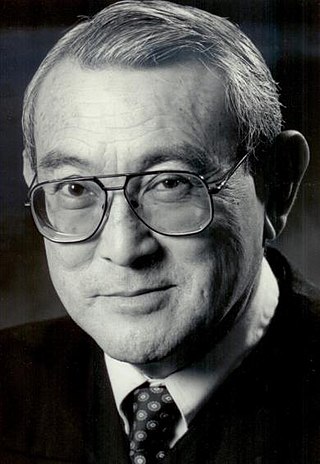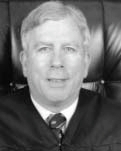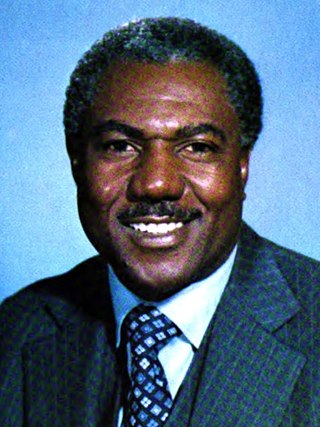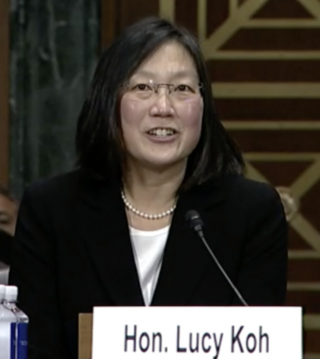Related Research Articles
Elk Grove Unified School District v. Newdow, 542 U.S. 1 (2004), was a case decided by the U.S. Supreme Court. The lawsuit, originally filed as Newdow v. United States Congress, Elk Grove Unified School District, et al. in 2000, led to a 2002 ruling by the United States Court of Appeals for the Ninth Circuit that the words "under God" in the Pledge of Allegiance are an endorsement of religion and therefore violate the Establishment Clause of the First Amendment to the United States Constitution. The words had been added by a 1954 act of Congress that changed the phrase "one nation indivisible" into "one nation under God, indivisible". After an initial decision striking the congressionally added "under God", the superseding opinion on denial of rehearing en banc was more limited, holding that compelled recitation of the language by school teachers to students was invalid.
A large body of research indicates that IQ and similar measures vary between individuals and between certain groups, and that they correlate with socially important outcomes such as educational achievement, employment, crime, poverty and socioeconomic status.

Mendez, et al v. Westminister [sic] School District of Orange County, et al, 64 F.Supp. 544, aff'd, 161 F.2d 774, was a 1947 federal court case that challenged Mexican remedial schools in four districts in Orange County, California. In its ruling, the United States Court of Appeals for the Ninth Circuit, in an en banc decision, held that the forced segregation of Mexican American students into separate "Mexican schools" was unconstitutional because as US District Court Judge Paul J. McCormick stated, "The evidence clearly shows that Spanish-speaking children are retarded in learning English by lack of exposure to its use because of segregation, and that commingling of the entire student body instills and develops a common cultural attitude among the school children which is imperative for the perpetuation of American institutions and ideals."
Ashcroft v. American Civil Liberties Union, 535 U.S. 564 (2002), followed by 542 U.S. 656 (2004), was a decision of the United States Supreme Court, ruling that the Child Online Protection Act (COPA) was unconstitutional as a violation of the First Amendment's guarantee of freedom of speech.

Marsha Lee Berzon is a senior United States circuit judge of the United States Court of Appeals for the Ninth Circuit.
William Alan Fletcher is a senior United States circuit judge of the United States Court of Appeals for the Ninth Circuit. Appointed by President Bill Clinton, Fletcher was confirmed by the U.S. Senate in 1998. Fletcher is a Professor (Emeritus) at the UC Berkeley School of Law, where he still teaches federal courts.

Milan Dale Smith, Jr. is an American attorney and jurist serving as a United States circuit judge of the United States Court of Appeals for the Ninth Circuit. Smith's brother, Gordon H. Smith, was a Republican U.S. Senator from 1997 to 2009. Milan Smith is neither a Republican nor a Democrat, and he considers himself to be a political independent.
Cecil Francis Poole was a United States circuit judge of the United States Court of Appeals for the Ninth Circuit, a United States district judge of the United States District Court for the Northern District of California, and a United States Attorney for the Northern District of California. He was the first African American to serve as a United States Attorney, the first African American to serve as a Judge of the Northern District of California and the second African American to serve as a Judge of the Ninth Circuit.

Atsushi Wallace Tashima is a Senior United States circuit judge of the United States Court of Appeals for the Ninth Circuit and a former United States District Judge of the United States District Court for the Central District of California. He is the third Asian American and first Japanese American to be appointed to a United States Court of Appeals.
Haywood v. National Basketball Association, 401 U.S. 1204 (1971), was a U.S. Supreme Court decision that ruled against the NBA's requirement that a player could not be drafted by an NBA team until four years after graduating from high school. Justice Douglas, in an in-chambers opinion, allowed Spencer Haywood to play in the NBA temporarily until the litigation could proceed further. The case was settled out of court, Haywood continued playing, and the NBA modified its four-year rule to allow players to enter the league early in cases of "hardship".

Roger Thomas Benitez is a senior United States district judge of the United States District Court for the Southern District of California. He is known for his rulings striking down several California gun control laws.

Cormac Joseph Carney is an inactive senior United States district judge of the United States District Court for the Central District of California.

James V. Selna is a senior United States district judge of the United States District Court for the Central District of California.

Wilson Camanza Riles Sr. was an American educator and politician from California. He was the first African American to be elected to statewide office in California.

Lucy Haeran Koh is an American lawyer serving as a United States circuit judge of the United States Court of Appeals for the Ninth Circuit. Koh previously served as a United States district judge of the United States District Court for the Northern District of California from 2010 to 2021. She also served as a California state court judge of the Santa Clara County Superior Court from 2008 to 2010. She is the first Korean American woman to serve on a federal appellate court in the United States.

Able v. United States, 88 F.3d 1280, 155 F.3d 628, is a case from the United States Court of Appeals for the Second Circuit that upheld the Don't ask, don't tell law against various constitutional challenges. Both Able I and Able II overruled district court decisions striking down "Don't ask, don't tell" as unconstitutional.

Conant v. Walters, 309 F.3d 629, is a legal case decided by the United States Court of Appeals for the Ninth Circuit, which affirmed the right of physicians to recommend medical marijuana. The Court of Appeals affirmed the earlier decision of the United States District Court for the Northern District of California, which was filed under the caption Conant v. McCaffrey. Though the case involved chronic patients with untreatable diseases, the decision does not name these conditions as a prerequisite, nor does it limit drugs which may or may not be illegal.

State of Washington and State of Minnesota v. Trump, 847 F.3d 1151, was a lawsuit that challenged the constitutionality of Executive Order 13769, issued by U.S. president Donald Trump.

Dr. Seuss Enters., L.P. v. Penguin Books USA, Inc. 109 F.3d 1394 is a copyright lawsuit where the court determined if a copy of an original work's artistic style, plot, themes, and certain key character elements qualified as fair use. Penguin Books published a book titled The Cat NOT in the Hat! A Parody by Dr. Juice that use the artistic style, themes and characteristics of Dr. Seuss books to tell the story of the O. J. Simpson murder case. Dr. Seuss Enterprises accuse the publisher of copyright and trademark infringement.
Biden v. Texas, 597 U.S. ___ (2022), was a United States Supreme Court case related to administrative law and immigration.
References
- 1 2 3 Woods, Isaac L.; Graves, Scott L. (June 1, 2021). "The Fortieth Anniversary of Larry P. V. Riles: Cognitive Assessment and Black Children". Contemporary School Psychology. 25 (2): 137–139. doi: 10.1007/s40688-021-00373-6 . ISSN 2161-1505.
- ↑ Romney, Lee (October 18, 2019). "A Landmark Lawsuit Aimed to Fix Special Ed for California's Black Students. It Didn't". KQED. Retrieved March 13, 2023.
- 1 2 3 4 "Larry P. v. Riles, 495 F. Supp. 926 (N.D. Cal. 1979)". Justia Law. Retrieved March 13, 2023.
- ↑ "Larry P., by His Guardian Ad Litem, Lucille P. et al. v. Wilson Riles, et al., Defendants, 793 F.2d 969 (9th Cir. 1986)". Justia Law. Retrieved March 13, 2023.
- 1 2 "What is the Larry P. v. Riles case? How did it originate?". SERR – Special Education Rights and Responsibilities. Disability Rights California. Retrieved March 13, 2023.
- ↑ "Demond Crawford v Bill Honig. 37 F.3d 485 (9th Cir. 1995)". Justia Law. Retrieved March 13, 2023.
- ↑ Walsh, Mark (October 12, 1994). "Appeals Court Upholds Black Parents' Rights To Learn Child's I.Q." Education Week. Retrieved March 13, 2023.
- ↑ Mathews, Jay (July 6, 1987). "IQ tests restricted by race". Washington Post. Retrieved March 13, 2023.
- ↑ "CASP's Response to CDE's Memorandum on Special Education of African American Students" (PDF). California Association of School Psychologists. Retrieved June 4, 2024.